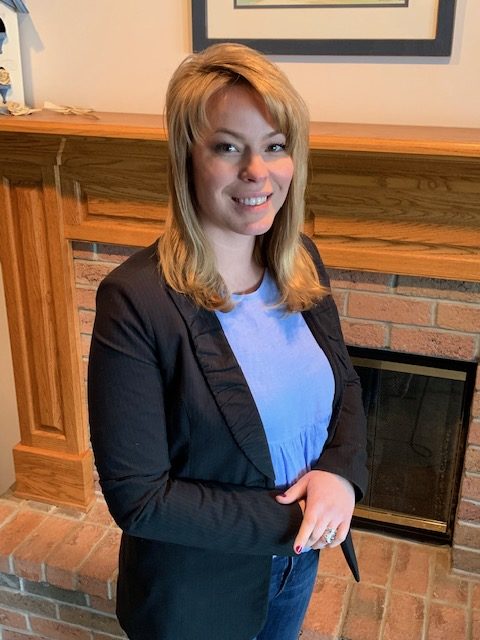Candidates: Door County Board, District 9
- Share
- Tweet
- Pin
- Share

Laura Vlies Wotachek
Wotachek, 37, lives with her husband and two daughters. She is working toward her bachelor’s degree at UW – Green Bay and is a graduate of the UW Government Leadership Academy. She holds a paralegal associate degree, nursing associate degree (licensed RN), and is an emergency medical technician graduate (nationally registered and Wisconsin-licensed EMT), all from NWTC–Green Bay, as well as certifications for our National Incident Management System through her years working on a rescue squad.

Relevant Experience/Civic Engagement
I am honored to be your county board supervisor for the past three years. I have firsthand knowledge of county issues and the experience to address them. My career in health-care management as a registered nurse and teaching at NWTC for emergency services over a decade helps to identify the needs of our community.
In 2019, I received government training for complicated issues and building consensus. Of course, any parent of a nine- and 10-year-old could say survival depends on building consensus. As a paralegal, I am detail oriented in reviewing ordinances and resolutions, along with our $78 million operating budget. I actively advocate for our county in Madison and follow legislative news and bills.
During the past 15 years, I have volunteered for many nonprofit organizations. Some include the Alcohol and Drug Coalition and Rogue Theater, and I started the Fairest of the Fair program.
Dan Williams
Williams, 71, has lived in Sturgeon Bay for 30 years. He and his wife have two adult children. Postsecondary education includes paramedic certification, teaching methods for the adult learner. “I am a nationally certified EMS compliance officer,” Williams said. “I have attended more than 3,500 hours of continuing education in EMS management, communications leadership, disaster management and general financial principles.“
Relevant Experience/Civic Engagement
My experiences include being a paramedic, director of emergency service for Door County, chief of EMS for the state of Wisconsin, director of the UW Hospital and Clinics’ Med Flight Program. I have spent my entire career serving the public.
Awards and/or recognitions include the Star of Life recognition from the American Ambulance Association, the Star of Life recognition from the Professional Ambulance Association of Wisconsin, the American College of Emergency Physicians’ Paramedic of the Year Award, the Wisconsin EMS Association’s Award for Outstanding Contributions to EMS, past chair of the State EMS Advisory Board (appointed by three governors and served for 13 years), president of Paramedic Systems of Wisconsin, past president of the Professional Ambulance Association of Wisconsin, past chair to the committee that developed the national EMS computerized tests.
What attributes and skills do you bring to the county board?
Laura Vlies Wotachek (LW): I have always wanted to serve my country and community. I feel that service is part of my calling and a duty to give back to a community that has given me so much. I am dedicated to meeting the needs of our county through listening, research and collaboration.
I am ambitious, yet understanding and respectful of the process. Some government decisions take time, foresight and public input; other decisions call for quicker action to help each other, such as how our county is addressing the COVID-19 virus. We need leadership that is willing to work with all people to find common ground. I am proud to say that I am doing just that. I have worked hard for you with other supervisors and county employees to make significant progress on addressing community needs.
Dan Williams (DW): I have the ability to calmly listen to people and study the facts and figures before making decisions. The duty of a county supervisor is to live in and represent the district and make decisions that are in the best interest of the county and the city in an honest and ethical manner.
My work history has centered on leadership within municipalities and businesses. I have the expertise to understand labor agreements, purchasing contracts, development and management of budgets and personnel-related matters. I have been requested on many occasions to mediate situations that have split relationships among people, organizations, municipalities and government bodies.
Do you believe the county is doing enough to ensure groundwater quality? If not, what more should the county be doing?
LW: No. There are experienced and well-educated individuals working for our county on this topic, but I think there is always room for improvement, and many agree.
Currently, we do not have restrictions over land areas that contribute to the city water supply. With District 9 having the most agricultural land within city limits and significant areas of contribution outside the city limits, I feel we need to protect these areas. Even though our city water is treated, the county should research and implement policies to better manage the manure and nutrients added to these land areas to better protect our water supply.
Countywide, the most significant contributors to our groundwater issues are from agricultural practices and private septic systems. Last year the county started a well-water testing program that will continue in 2020. We need to evaluate these data and address constituents’ concerns by reviewing our policies.
DW: I don’t believe that a county – or any rural area that doesn’t have the benefit of municipal sewage-treatment plants and water-purification systems – is able to do enough to ensure water quality. Many of the water-quality issues in our county and neighboring counties center around issues related to runoff.
The advent of megafarms and the resulting manure produced require a different approach about how to properly dispense the waste. Door County has a very fragile natural filtration system that can become contaminated easier than in most other areas of the state.
Stronger requirements for self-sustaining manure-management systems need to be encouraged or even mandated when a herd number reaches a certain level. However, without proper incentives – both in assistance and regulation – it will be difficult to manage this growing problem.
Rural broadband internet access has been cited as a problem by residents and businesses throughout Door County. What should the county do to increase broadband access?
LW: I feel there are multiple ways the county can help to implement broadband access. All of these require the county to collaborate with the private sector.
The county has an existing fiber network that can help with internet access, and we need to leverage this awesome asset.
The county can address the limitations in the county code. We need to separate the types of regulated towers and allow for those that are dedicated to broadband access. I believe in compromise to give the people what they need to live and prosper while ensuring safety and responsibility as needed.
The county should continue to work with the local units of government to help secure the state grant through the Public Service Commission. In 2019, we supported eight grants, and we will want to be ready for the next round of grants in 2020.
DW: Years ago, broadband internet access was considered a luxury by many, but quality connectivity to the internet is now an essential fact of life. As people’s lives change, so does the need to be more connected.
As we know, many come to Door County to enjoy all that we have to offer. However, you frequently hear complaints such as, “If I am not going to be able to have reliable, fast internet service, I will not be able to stay as long.” With society becoming continually more mobile and people adopting the work-on-the-go mentality, internet access becomes essential.
There have been many studies on the issues associated with creating reliable broadband throughout the county. I believe that we need to stop asking for study after study that essentially all say the same thing and start taking action on solving this issue.
Affordable housing continues to be an issue in Door County. Should county government play a role in addressing the shortage of affordable rental units and homes for purchase, and if so, how?
LW: Yes. The government should assist in meeting the basic needs of people. Housing prices across the state continue to rise, and since 2009, this trend has only become worse.
We can address this issue by implementing the goals set by the 2019 County Wide Housing Study. For example, the county can review the zoning code to provide for more housing options. This past year, I, along with the county board, helped to ensure that a 40-unit affordable-housing development would proceed by leveraging $1.4 million in grant money to offset costs.
The county also used vacant property that was taken through the In Rem process and worked with the local municipality to develop affordable housing. This concept can be applied throughout the entire county when the right property becomes available.
DW: In February of 2019, the Door County Economic Development Corporation (DCEDC) released a long-awaited housing study. The DCEDC commissioned the study in conjunction with local communities and business partners. The study noted that Door County has a lack of workforce rental housing of 330 apartments. There will be a future need of 135 apartments to meet the demand for senior housing.
The county needs to be proactive in the consideration of zoning to allow both for future development and to protect the neighborhoods that currently exist. We need to work with potential developers to meet the needs of all people within the county.
Since the study was released, numerous developers have made inquiries about areas available for development. The bottom line is that we need to do better and make the county a place where a young family starting out can afford to work, live and raise a family.
What other issues do you hope to engage in as a member of the county board?
LW: For my next term, I will focus on fiscal responsibility and the livability of Door County. We need to address the county levy limits that impact our services, find alternative funding sources for our county fair, and a permanent funding stream for our transportation program, Door 2 Door. Of course, I’d love to finalize the county Ahnapee Trail in District 9, too. 🙂
Now for this pandemic, we need to make sure basic needs are being met and county government communications are clear to the people during this (hopefully) once-in-a-lifetime experience.
Lastly, growth among departments and the county board has permeated into goals and better planning. With the issues we face – and now the pandemic – we need to continue this strong collective leadership. District 9, I hope you will continue to trust in my leadership as your county supervisor.
DW: I believe that the county has many opportunities in its future. We have several housing developments that are in progress, with more on the horizon. The Door County Economic Development Corporation is second to none with the things it is doing to grow Sturgeon Bay and the county through the support given to startup businesses and working with established businesses so that they can prosper and grow.
All of this brings a very positive energy, which is exciting. We need forward-thinking individuals on the county board who will work for the county and respect the ethical obligations that come with an elected office. We need to show that Door County is open for business.

